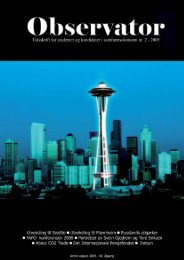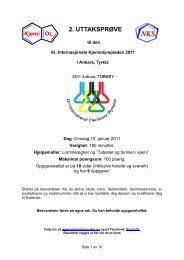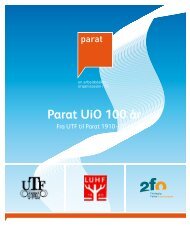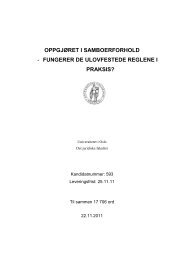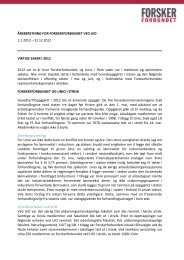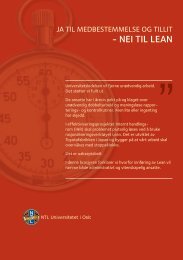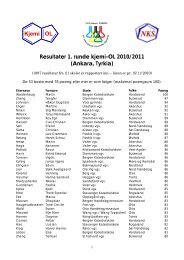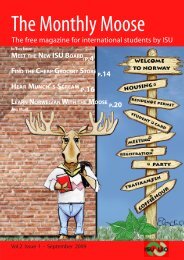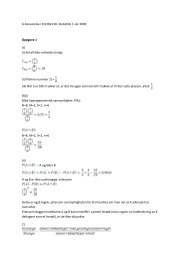filosofisk supplement - Universitetet i Oslo
filosofisk supplement - Universitetet i Oslo
filosofisk supplement - Universitetet i Oslo
- No tags were found...
Create successful ePaper yourself
Turn your PDF publications into a flip-book with our unique Google optimized e-Paper software.
Se a d Zi m e r iproviding monolithic definition of Islam as a case of puredelusion. Islam, like any other social movement is pluraland changing. It ‘is the result of continuous historical andsocial construction of human actors; it is a series of political,intellectual cultural, economic and juridical faitsaccomplis given to be perceived, interpreted, lived…’. 13Put differently, Islam is the immanent, evolving mode ofa contingent being, unfolding in a number of possible actualizations,discursively manufactured in ‘the act of obedienceto a socio-political and religious body in the processof institutionalization’. 14Considering the steady proliferation of conflictingdiscourses and indeterminacy of the various definitions ofIslam, I will opt for a hermeneutic approach to Islam, usedall too loosely here, as the ontological horizon or frameof reasoning and its (however unstable) epistemological limitsinitiated and founded by the prophet Muhammad inMecca and recorded after his death in a book named theKoran as well as an ethical mode of conduct. What exactlythis ethical mode of conduct or moral order and the statusof its interpellated subjects was is difficult to ascertainconsidering the role of the human mind in dialecticallysublating norms to its needs. Islam is the name for the horizonopened up by the prophetic parallactic event whichstrove to refashion human beings in the image of the newlyacquired perspective, unthinkable prior to the time ofthe prophet. The intellegibility of the ensuing commands,reprimands, prohibitions, exhortations, etc, was ensuredby reference to the newly opened prophetic horizon andthe subversive and daring ethics of resistance which theprophet championed. As a result of this prophetic event,people were transformed and in the face of the new horizon,the old polytheistic horizon appeared as if it wasalways wrong.In the first years of Islam, nothing really changed in theobjective socio-economic relations. It was a case of pure parallax,yet, on the subjective level, the subjective position,everything changed. It is only fair to credit Muhammadwith changing the world of heathen Arabs by direcly disturbingthe subjective libidinal economy and the politicsof enjoyment of its new followers. As if all of a suddenwhat had seemed indisputable and sacred to the prophet’scompanion, after their contact with, and openess to Islam,was no longer so. Islam is therefore conceived here notas a system of rules but as a paradigm which defines aswell as constitutes, circularly of course, the intellegibilityof the horizon; the horizon that ‘determines the questionsthat can be asked and those that are excluded, the thinkableand the unthinkable’. 15 This horizon/frame of Islamhowever is partly framed by its content. ‘The aim of thehermeneutical endeavour’ then comes ‘to render visiblethe contours of a “frame”, a “horizon” that, precisely bystaying invisible, by eluding the subject’s grasp, in advancedetermines its field of vision’. 16We can also approach, following Arkoun, both theKoran as an ‘epic narrative’ and Islam as events and happenings.This would allow us to differentiate between theKoran and Islam as two different manifestations, two sidesof the same coin. They are different in the sense that theyare englobed within a hermeneutic horizon which keepsthem separate with distinct identities but within an ontologicalhorizon of interrelatedness that confines them toa common point of reference. Within the space openedby the Koranic event, the Islamic event moves and orientsitself in the sense of understandings and interpretationsof the Koranic event. 17 Therefore, it is not that importantthat Muslims, or non-Muslims for that matter, offer contradictoryinterpretations of the same event as long as theyremain within the same horizon. It would not have beenan event if it were not open to more than one understanding,i.e. subjective appropriation of the revelation expressedin terms of fidelity or infidelity (as the case may be) tothe event. And yet, it cannot be an event, which by definitionrestructures the very coordinates of thinking and reasoningif it cannot provide a new horizon and structure ofmeaning, to start, as it is, from anew; to constitute its owncognitive limits of what is possible and impossible to thinkwithin its own coordinates of reasoning. Islam in this senseis the space opened and simultaneously contained by theKoran. However, the way to approach it passes throughthe specific instances of interpretations that function asthe mediation point between the horizon of the Koranicevent and the changing socio-economic conditions of times.Interpretations are the bridge that relate and negotiatetwo or more different horizons of being. Interpretationsthus conceived are an instrument not only of controllingand limiting the possibility of change which may causethe decline, suspension, and replacement of the Koranichorizon, but also of justifying the desirable changes.Viewed from this perspective, Islam as an instance ofdouble movement of interpretation is a historically dynamiccategory. The process of transforming the individualor the society is subject to the same transformation as anexpression of the demands of both history and religion.In this sense, one can hardly speak of misinterpretationseven though there are plenty instances of mistaken under-6





